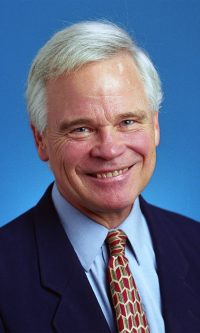DG MARTIN COLUMN: Holden Thorp shares his diagnosis and more
Published 11:42 am Tuesday, May 7, 2024
|
Getting your Trinity Audio player ready...
|
Holden Thorp, former chancellor of the University of North Carolina at Chapel Hill and one of the smartest people I have ever known, made a startling announcement last week.

D.G. Martin
In the April 28 edition of “Science,” the magazine he edits, he wrote, “I am autistic. I have had had my diagnosis for several years but have only come to the conclusion to be public about it over the last year.”
Thorp explains why he delayed sharing this information and why now is the time to open up. “All brains work differently. Individuals process information and engage with the world in ways that are influenced by a multitude of biological, cultural and social factors.
“In the world of science, these differences are what spark innovation. This is why the scientific community needs to better recognize the enormous potential of neurodiversity and bear in mind that certain behavioral and cognitive traits that may strike some as unusual can be catalytic to the scientific quest.
“I am autistic. This diagnosis, which came in my adult life, explained many things about my past. It also increased my awareness of the scope of work needed to unravel the complexity of cognition and to reduce the stigma and exclusion associated with autism spectrum disorder and other neurological conditions. Neurodiversity, I learned, is a broad phenotype that encompasses people who are on the spectrum for different reasons.
“Growing up, I became accustomed to comments from teachers about being ‘hard to read.’ I had very specific interests in music and science — but I was fortunate, especially as a child, to have had friends who included me. When I became a chemistry professor, student evaluations sometimes noted a monotone communication style. ‘Wooden’ was the feedback I occasionally received as a university administrator. I attributed my awkwardness and inability to pick up on certain social cues as part of being an introvert.
“It was not until I became the chancellor of a large public university that I became aware of these traits as an obstacle. I struggled to meet the expectations of an institutional leader who must constantly interact with people who are not part of the academic community. I received extensive training on eye contact, hand motions, and modulation of vocal tone to help my performance on the job.
“When I became a provost at a private university, my mannerisms stood out again when I tried to fit in with outside stakeholders. It was suggested in a performance evaluation by a respondent that I had Asperger’s syndrome (a condition later folded into autism spectrum disorder), which was confirmed by the facilitator who was well-qualified to give this diagnosis. That had never occurred to me because of my outdated idea of autism as referring exclusively to nonspeaking children who required intensive help at home and at school.
“It took a few years for the realization to sink in, but I knew that I was fortunate to have a form of autism that allowed me to do all the things I had done, as well as financial and personal support. Many autistic people do not receive such reinforcement, especially those with severe, debilitating symptoms who have different needs and live in places where resources are lacking. After talking to many advocates who are themselves autistic, I learned how useful it can be for us to disclose our diagnosis and to help reduce the stigma.”
Thorp’s announcement will be a comfort and an inspiration to families who learn one of their children is “on the spectrum.” It should also inspire them to take extra steps to insure their children get the education, training, love and support like that Thorp received and sought out.
One thing for sure, Thorp is not the only genius to have struggled with autism. He can find plenty of company on the lists of people with or believed to have been challenged with autism.
Thorp has promised to continue the discussion of his experience.
We will be reading, listening and learning from a great teacher who happens to have autism.
D.G. Martin, a retired lawyer, served as UNC-System’s vice president for public affairs and hosted PBS-NC’s “North Carolina Bookwatch.”


